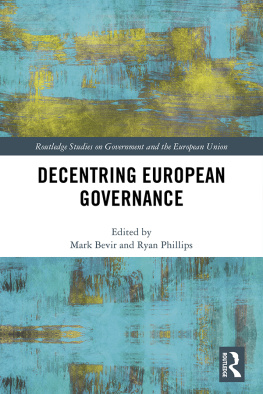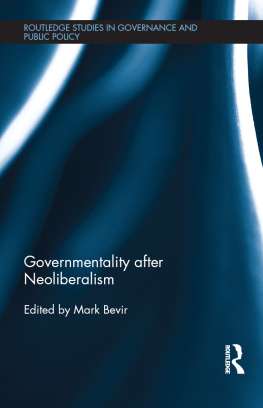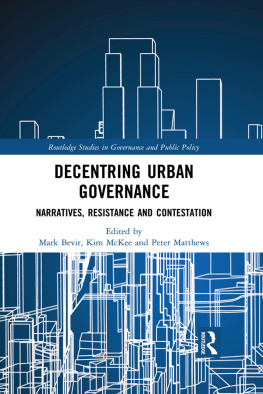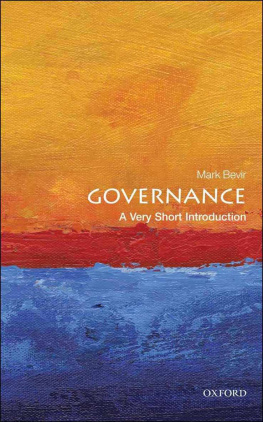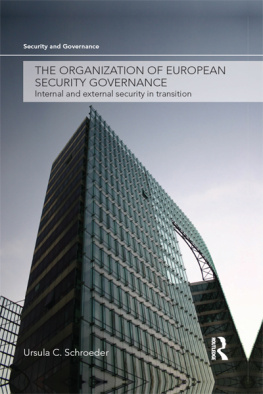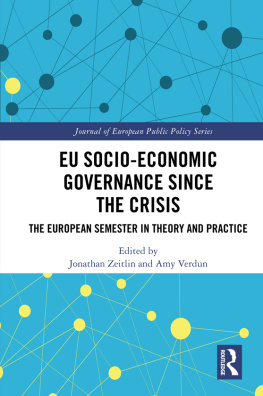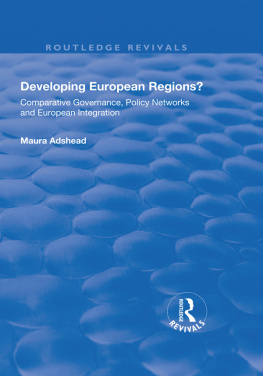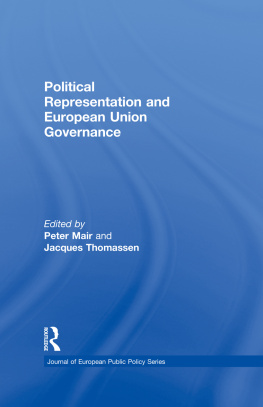Decentring European Governance
Conforming neither to the hierarchical and bureaucratic organization of the European nation-state nor the anarchical structure of international organizations, the European Union (EU) and its predecessors provide an exemplary site for developing a decentred approach to the study of governance.
The book offers an analysis of the formation and transformation of the EU as an example of governance above the nation-state and is framed by the recognition that the construction of the EU has resulted in variegated and decentred forms of governance. The chapters look at distinct aspects of EU governance to bring to light the influence of elite narratives, scientific rationalities, local traditions and meaningful practices in the making and remaking of European governance. As such, each chapter offers a unique contribution to the study of the EU. In doing so, the book challenges dominant narratives of European integration and policymaking that appeal to reified rationalities and social structures, and uncovers the contingency and conflict endemic to European governance.
This text will be of key interest to scholars and students of European Union politics, European politics/studies, governance and, more broadly, to public management, international organizations, anthropology and sociology.
Mark Bevir is a professor in the Department of Political Science, and Director of the Center for British Studies, at the University of California, Berkeley, USA.
Ryan Phillips is an assistant professor of Political Science at Lycoming College, USA.
Routledge Studies on Government and the European Union
Edited by Andy Smith
University of Bordeaux, France
Policy Change in the Area of Freedom, Security and Justice
How EU Institutions Matter
Edited by Florian Trauner and Ariadna Ripoll Servent
The Mechanisms of Institutional Conflict in the European Union
Ludvig Norman
Public Ethics at the European Commission
Politics, Reform and Individual Views
Andreea Nstase
Parliaments and the Economic Governance of the European Union
Talking Shops or Deliberative Bodies?
Aleksandra Maatsch
EU Presidencies between Politics and Administration
The Governmentality of the Polish, Danish and Cypriot Trio Presidency in 20112012
Mads Dagnis Jensen and Peter Nedergaard
Governing Europe in a Globalizing World
Neoliberalism and its Alternatives following the 1973 Oil Crisis
Laurent Warlouzet
European Values
Challenges and Opportunities for EU Governance
Edited by Franois Foret and Oriane Calligaro
Governing Sustainability in the EU
From Political Discourse to Policy Practices
Ekaterina Domorenok
Decentring European Governance
Edited by Mark Bevir and Ryan Phillips
Decentring European Governance
Edited by Mark Bevir and Ryan Phillips
First published 2019
by Routledge
2 Park Square, Milton Park, Abingdon, Oxon OX14 4RN
and by Routledge
52 Vanderbilt Avenue, New York, NY 10017
Routledge is an imprint of the Taylor & Francis Group, an informa business
2019 selection and editorial matter, Mark Bevir and Ryan Phillips; individual chapters, the contributors
The right of Mark Bevir and Ryan Phillips to be identified as the authors of the editorial matter, and of the authors for their individual chapters, has been asserted in accordance with sections 77 and 78 of the Copyright, Designs and Patents Act 1988.
All rights reserved. No part of this book may be reprinted or reproduced or utilized in any form or by any electronic, mechanical, or other means, now known or hereafter invented, including photocopying and recording, or in any information storage or retrieval system, without permission in writing from the publishers.
Trademark notice: Product or corporate names may be trademarks or registered trademarks, and are used only for identification and explanation without intent to infringe.
British Library Cataloguing-in-Publication Data
A catalogue record for this book is available from the British Library
Library of Congress Cataloging-in-Publication Data
A catalog record has been requested for this book
ISBN: 978-0-8153-8181-5 (hbk)
ISBN: 978-1-351-20955-7 (ebk)
Typeset in Times New Roman
by Wearset Ltd, Boldon, Tyne and Wear
Contents
Editors
Mark Bevir is a professor in the Department of Political Science, and director of the Center for British Studies, at the University of California, Berkeley. He is also a professor in the Graduate School of Governance, United Nations University MERIT, Maastricht, Netherlands, and a Distinguished Research Professor in the College of Arts and Humanities, Swansea University, UK. He is the author or editor of various books, most recently Interpretive Social Science: An Anti-naturalist Approach (with Jason Blakely, Oxford University Press, 2018).
Ryan Phillips is an assistant professor of Political Science at Lycoming College. His research focuses on the European Union, democracy and methodology. He is currently working on a book manuscript that addresses the constitutionalization of democracy in the EU since the early 1990s. His previous research has appeared in Comparative European Politics and The British Journal of Politics & International Relations.
Contributors
William Biebuyck teaches global politics and human security within the International Studies program at Georgia Southern University. His current research explores transitional genealogies in food security and agrarian policy. His published work has appeared in journals such as Comparative European Politics and the European Journal of Social Theory.
Caterina Carta is an associate professor at the Political Science Department of Laval University (Qubec City, Canada). Before being invited by Laval University to hold the Canada Research Chair in Public Diplomacy, Caterina Carta was an assistant professor at Vesalius College from 2012 to 2017 and a postdoctoral researcher at the ULB from 2011 to 2012. Her research interest includes foreign policy, cultural and public diplomacy, discourse theory and analysis. Her publications include The European Unions Diplomatic Service: Ideas, Preferences and Identities (Routledge, 2012) and Making Sense ofDiversity: EUs Foreign Policy through the Lenses of Discourse Analysis (Ashgate, 2014), that she edited with Jean-Frederic Morin. Her publications have appeared in Review of International Studies, The British Journal of Politics and International Relations, Cooperation and Conflict, and Journal of Language and Politics.
Dion Curry is a senior lecturer in Public Policy at Swansea University. His current research focuses on the intersection of political trust and legitimacy and their effects on (and by) governance processes, including citizen-led governance initiatives. His book, Network Approaches to Multi-Level Governance, is available with Palgrave Macmillan.
Dorota Dakowska is a professor of Political Science at the University of Lyon 2 and Junior Fellow of the Institut Universitaire de France. She has published a book on the German political foundations and their involvement in democratization processes (

